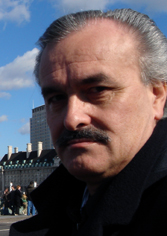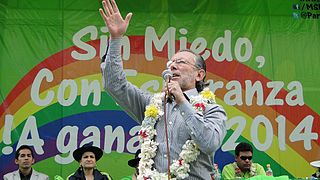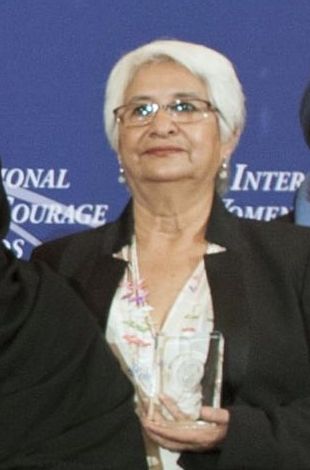
Octavio Paz Lozano was a Mexican poet and diplomat. For his body of work, he was awarded the 1977 Jerusalem Prize, the 1981 Miguel de Cervantes Prize, the 1982 Neustadt International Prize for Literature, and the 1990 Nobel Prize in Literature.

Luis García Meza Tejada was a Bolivian general who served as the de facto 57th president of Bolivia from 1980 to 1981. He was a dictator convicted of human rights violations and leader of a violent coup. A native of La Paz, he was a career military officer who rose to the rank of general during the dictatorship of Hugo Banzer (1971–78).

Hernán Siles Zuazo was a Bolivian politician who served as the 46th president of Bolivia twice nonconsecutively from 1956 to 1960 and from 1982 to 1985. He also briefly served as interim president in April 1952, and as the 27th vice president of Bolivia from 1952 to 1956.
Augusto Monterroso Bonilla was a Honduran writer who adopted Guatemalan nationality, known for the ironical and humorous style of his short stories. He is considered an important figure in the Latin American "Boom" generation, and received several awards, including the Prince of Asturias Award in Literature (2000), Miguel Ángel Asturias National Prize in Literature (1997), and Juan Rulfo Award (1996). Monterroso was a member of the Honduran Academy of Language.

Alcides Arguedas Díaz was a Bolivian writer and historian. His literary work, which had a profound influence on the Bolivian social thought in the first half of the twentieth century, addresses issues related to national identity, miscegenation, and indigenous affairs. His most significant work, Raza de bronce (1919), is considered one of the most influential Bolivian literary works and a precursor of indigenism.

Carlos Ruiz Zafón was a Spanish novelist known for his 2001 novel La sombra del viento. The novel sold 15 million copies and was winner of numerous awards; it was included in the list of the one hundred best books in Spanish in the last twenty-five years, made in 2007 by eighty-one Latin American and Spanish writers and critics.
Pedro Shimose Kawamura is a poet, journalist, professor and essayist from Bolivia. He has been based in Madrid, Spain since 1971. Shimose is considered one of Bolivia's most notable poets.

Alfonso Gumucio Dagron is a Bolivian writer, filmmaker, journalist, photographer and development communication specialist. His father was Alfonso Gumucio Reyes, a leader of the Movimiento Nacionalista Revolucionario (MNR), Minister of Economy during the Government of Víctor Paz Estenssoro, and Ambassador to Uruguay and Spain. He is the author of several books on film and [communication for social change, as well as documentary films, photographic exhibits and hundreds of articles in journals. He has worked in five continents on social development projects, as a communication for development specialist.

Víctor Montoya is a Bolivian writer, cultural journalist, and pedagogue. Imprisoned by the dictatorship in his native Bolivia, he became an exile following a campaign by Amnesty International in 1977.

Arthur Posnansky (1873–1946), often called "Arturo", was an Austrian engineer, explorer, ship’s navigator, entrepreneur, La Paz city council member, and amateur archaeologist. During his lifetime, Posnansky was known as a prolific writer and researcher and for his active participation in the defense and development of Bolivia. He is well known for his books, including Tihuanacu, the Cradle of American Man, Campana de Acre, La Lancha "Iris", Die Osterinsel und ihre praehistorischen Monumente, and Razas y Monumentos Prehistóricos del Altiplano Andino. Many, if not most, of his theories have been rejected by modern scholars.

Juan Fernando del Granado Cosío, often referred to as Juan Sin Miedo, is a Bolivian human rights lawyer and politician who served as mayor of La Paz from 2000 to 2004 and 2005 to 2010. A member of the Fearless Movement, of which he was leader, he previously served as a member of the Chamber of Deputies from La Paz from 1993 to 1999.

General elections were held in Bolivia on 29 June 1980, the third in three years. As no candidate in the presidential elections received a majority of the vote, the National Congress was required to elect a President on 6 August. With Hernán Siles Zuazo of the Democratic and Popular Union the favourite to win the Congressional ballot, the process was disrupted on 17 July by the military coup led by General Luis García Meza Tejada. However, Meza was pressured to resign on 4 August 1981, resulting in General Celso Torrelio becoming president. In July 1982 he was replaced by General Guido Vildoso, who was named by the high command to return the country to democratic rule. On 17 September 1982, during a general strike that brought the country close to civil war, the military decided to step down, to reconvene the National Congress elected in 1980, and to accept its choice of president. Accordingly, the National Congress revalidated the 1980 election results on 23 September and overwhelmingly elected Hernán Siles Zuazo as president on 5 October. He subsequently assumed the presidency on 10 October 1982.

Jaime Aparicio Otero is the Bolivian Permanent Representative to the Organization of American States and was Bolivian Agent to the International Court of Justice, in the Hague, in the process against Chile related to the Silala waters. Ambassador Aparicio is a career diplomat, lawyer, journalist and a Washington-based legal and political advisor. He was also a political analyst working in international public and corporate affairs in Latin America, the Caribbean, North America, and Europe. He has a Law Degree from the Higher University of San Andrés of La Paz, the Bolivian Diplomatic Academy and the Institute d’Etudes Politiques commonly referred as Sciences Po de Paris.

The Cinema of Bolivia comprises the film and videos made within the nation of Bolivia or by Bolivian filmmakers abroad. Though the country's film infrastructure is too small to be considered a film industry, Bolivia has a rich film history. Bolivia has consistently produced feature-length films since the 1920s, many of which are documentary or take a documentary approach to their subject. Film historian José Sánchez-H has observed that the predominant theme of many Bolivian films is the country's indigenous cultures and political oppression.

Rosa Julieta Montaño Salvatierra is a Bolivian attorney, human rights defender, woman's rights activist, feminist writer and a 2015 winner of the US State Department's International Women of Courage Award.

José Edmundo Paz-Soldán Ávila is a Bolivian writer. His work is a prominent example of the Latin American literary movement known as McOndo, in which the magical realism of previous Latin American authors is supplanted by modern realism, often with a technological focus. His work has won several awards. He has lived in the United States since 1991, and has taught literature at Cornell University since 1997.
Rodolfo "Rudy" Ayoroa was a Bolivian painter and a sculptor.
Luís Espinal Camps (1932–1980), also known by the nickname "Lucho" and by the Catalan name Lluís Espinal i Camps, was a Spanish Jesuit priest, poet, journalist, filmmaker, and film critic.

Gustavo Gac-Artigas is a Chilean American writer, playwright, actor, theater director, and editor. Born in Santiago, Chile, he has lived in New Jersey since 1995. He is a correspondent member of the North American Academy of the Spanish Language.

Miriam Marcela Revollo Quiroga is a Bolivian academic, politician, and sociologist who served as a member of the Chamber of Deputies from La Paz, representing circumscription 10 from 2010 to 2015. Though Revollo's political career is closely linked to that of her husband, longtime La Paz Mayor Juan del Granado, her political origins are independent of marriage. A graduate of the higher universities of San Simón and San Andrés, Revollo entered political life as an activist in the student movement and was a steadfast advocate for the inclusion of women in the country's democratic process. Together with her husband, she founded the Fearless Movement, with which she was elected as a party-list member of the Constituent Assembly from La Paz from 2006 to 2007. As a parliamentarian, she continued to work toward the advancement of women's causes, largely supporting the social policies enacted by the ruling Movement for Socialism, even as she simultaneously criticized many of the administration's illiberal practices.















